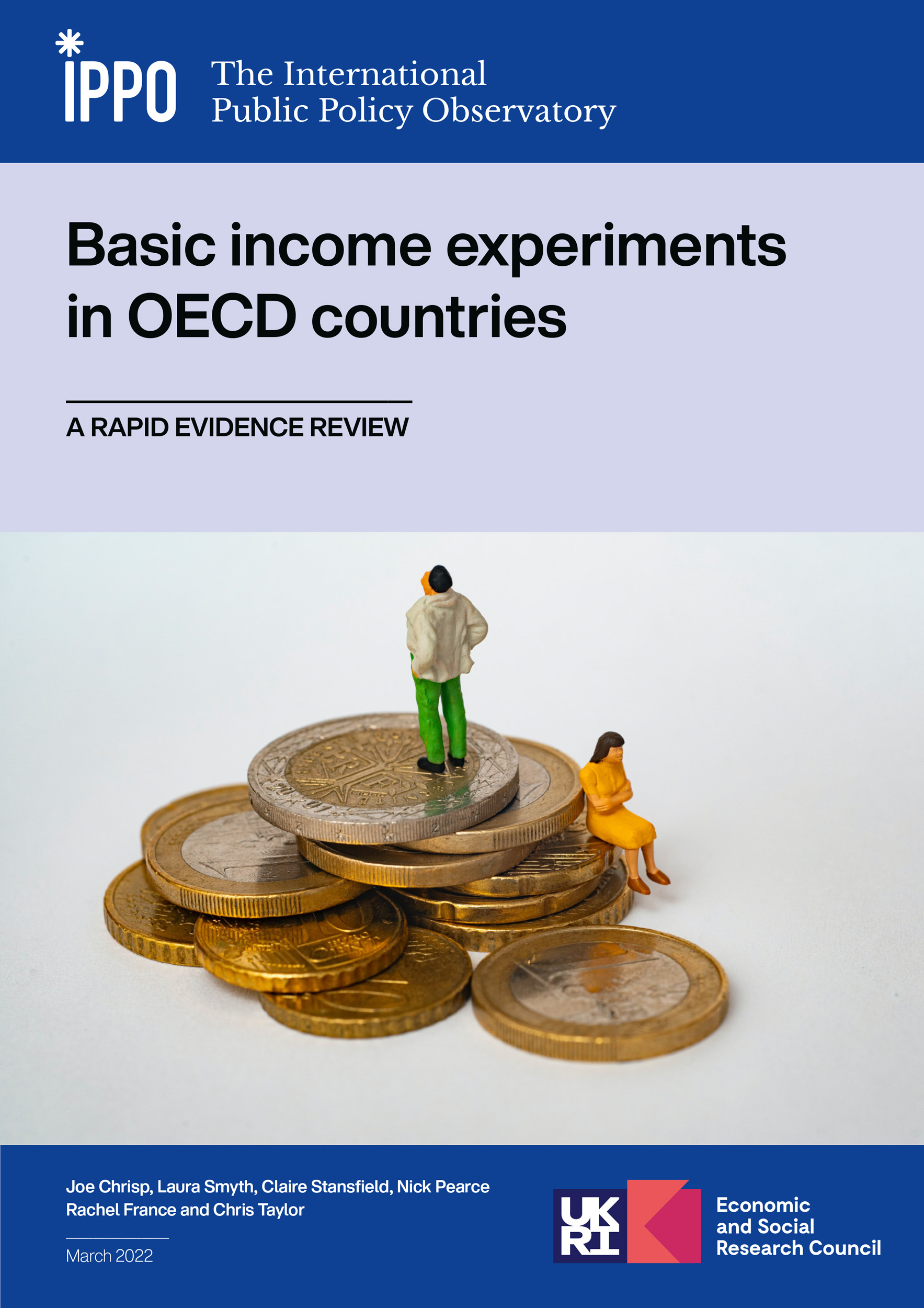Rapid Evidence Review: Basic income experiments in OECD countries

This is a summary of findings and recommendations from a review of basic income experiments in OECD countries by the Institute for Policy Research, University of Bath, and IPPO.
To read the full report, click here.
Introduction

Since 2015, there has been a surge in political and media interest in a universal basic income (UBI), which has led to a growth in social policy experiments tied to this idea. The payment of a regular income to everyone in society, with no strings attached. This report provides an evidence-based summary of existing experiments for policymakers.
We identified 38 relevant experiments, 21 of which had been completed by November 2021.
What did we find?
- The majority were ‘bottom-up’ and not led by national governments, with a growing trend for the involvement of NGOs.
- Most had a small number of participants.
- Most focused on low-income households or benefit recipients rather than on a sample from a universal population.
- Nearly all were targeted and dispersed rather than universal within saturated sites.
Key takeaways
- Evidence on employment outcomes is weak or not statistically significant in most cases. Except for certain sub-groups in specific contexts.
- Most experiments show positive wellbeing effects, although the evidence is also often limited and subjective.
- No experiments to date have ended with the implementation of a basic income
- Most have not led to any clear policy reform according to available data.
Key points for policymakers
How to meet research goals:
- Pay attention to sample size and design simplicity to enhance evidence robustness.
- Under-researched UBI elements include: effect on non-benefit recipients or members of low-income households; effect over a longer period of time; and its effect on a small community when it is universally provided.
How to meet pilot goals:
- Experiments should test schemes and interventions that would be fiscally and legally feasible for that level of government to implement.
How to meet political goals:
- More work should be done to build coalitions within civil society and political groups with outreach done before, during and after the experiment itself.
Understanding our work
This report aims to provide an experimental design ‘tool-kit’ for policymakers by drawing on past experiences of governments in OECD countries.
Our rapid evidence review gives a comprehensive and systematic mapping of all UBI experiments that fall within our criteria. The review compares the characteristics, key results and policy outcomes of all the experiments in OECD countries that we have included and highlights some common themes.
The review identifies 38 experiments that fit our criteria, although many of these are within the same context or receive similar funding, such as the four negative income tax experiments in the US in the 1960s and 70s and the ten experiments conducted by Dutch municipalities between from 2017.
How to design a UBI experiment: 3 Key Factors
Research
Careful consideration should be paid to the sample size and the simplicity of the design to enhance the robustness of the evidence.
Past experiments have often included multiple interventions the effects of which are difficult to disentangle, particularly with a small sample size. Policymakers could also consider the gaps in current knowledge and design experiments so that aspects of a basic income that we do not have clear evidence on are examined. This may include, for example, (1) the effect of the benefit on those that are not already either benefit recipients or members of low-income households, (2) the effect of the benefit over a longer period of time or (3) the effect of the benefit on a (small) community when it is universally provided.
Piloting
It is essential to use a design that would be fiscally and legally feasible for that level of government to implement. This has not been the case in many past experiments, which inevitably limits the extent to which policy reform can be initiated that directly builds upon lessons from the experiment.
Politics
A key aim of the experiment is to persuade others that may have the power to implement such a policy. Designers of experiments here must tread a fine line between wanting to convey the reliability of their findings, precisely to strengthen the message that their policy intervention works, or to involve themselves more directly in outreach efforts and political campaigning alongside the experiment.
This is a trade-off because the latter risks falling foul of RCT guidelines and avoiding any outreach or campaigning risks entirely losing the public relations battle in framing the purpose and findings of the experiment.
APPENDIX
Topic specialist review authors:
- Dr Joe Chrisp, Institute for Policy Research, University of Bath
- Laura Smyth, Institute for Policy Research, University of Bath
- Dr Claire Stansfield, EPPI Centre, UCL Social Research Institute
- Professor Nick Pearce, Institute for Policy Research, University of Bath
- Dr Rachel France, STEaPP, Department of Engineering, UCL
- Professor Chris Taylor, Cardiff University Social Science Research Park (SPARK)
For more information about this IPPO systematic review or to speak to one of its authors, please email IPPO at ippo@ucl.ac.uk
